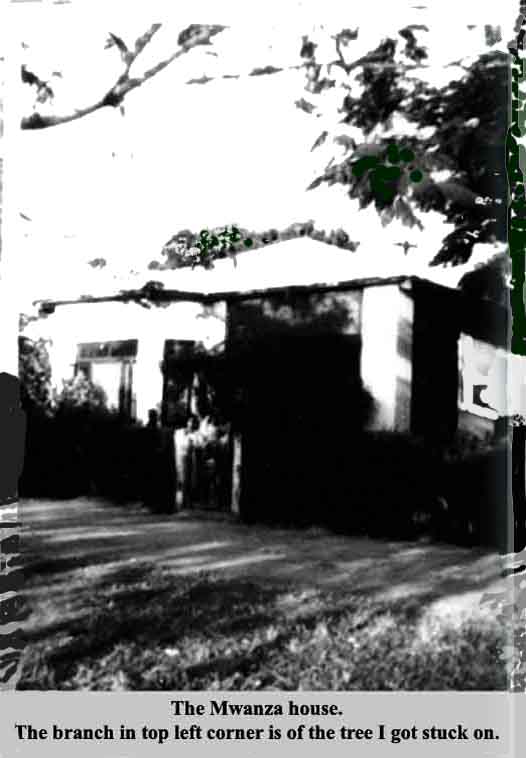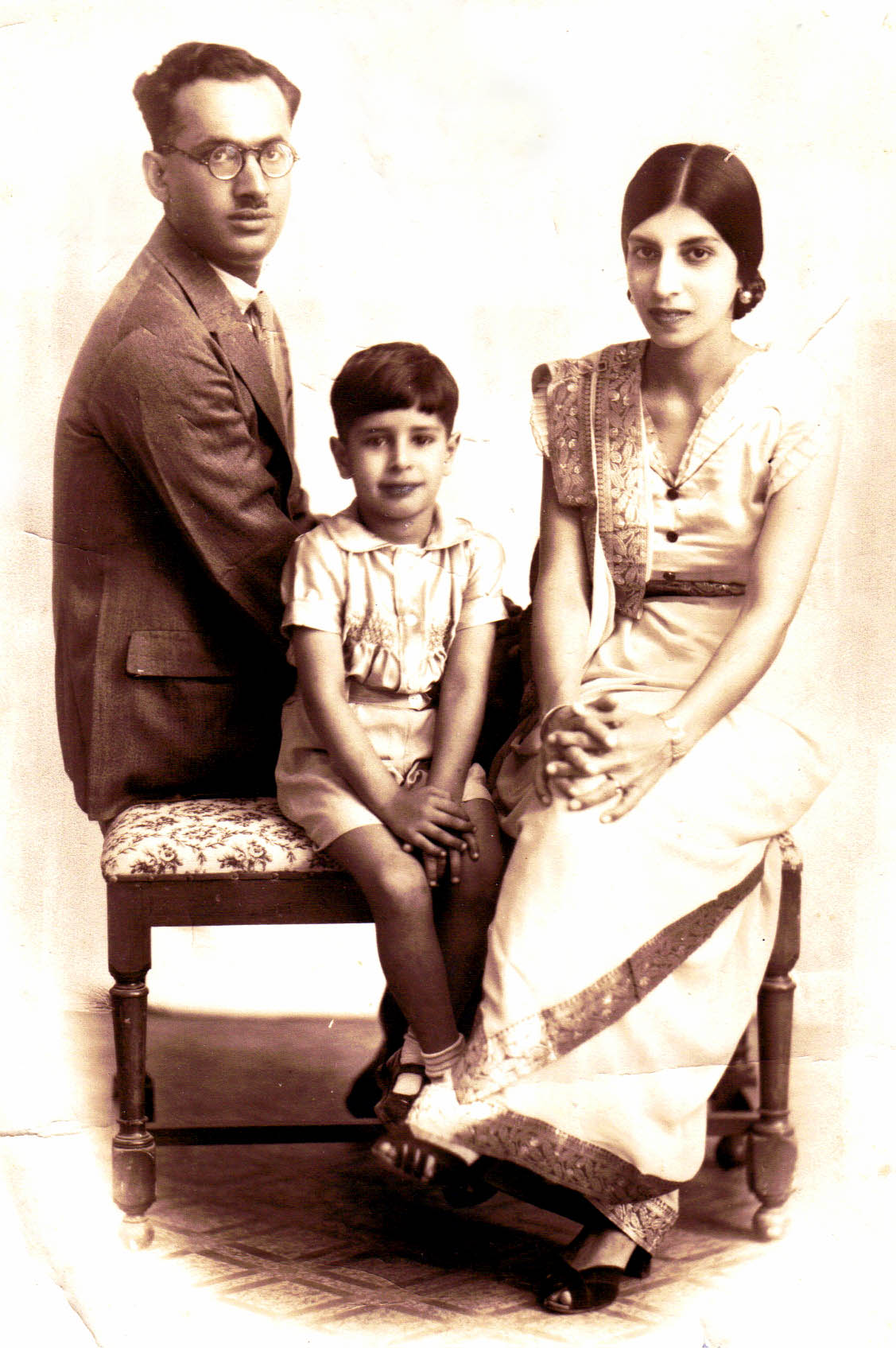2 Our House
We lived in a two-bedroom house, which was built, of concrete blocks white washed with lime. We had a very big garden on three sides, which was hedged in with manyara. Manyara is a cactus like bush with very green stalks, which oozes out white burning latex when snapped. For this reason it is used by the African cattlemen to make a boma, a corral, mingled with thorn-tree acacia branches. The boma keeps lions, leopards, cheetahs, jackals, and hyenas out during the night.
The front and the eastern side had the main large garden and there was another large area with a vegetable patch and a hen house in the back. There was a wooden gate in the fence opposite the front door. As the latch was too high for me to reach, I had cut out a hole near one of the gateposts. This was my quick escape and return route.
The house had corrugated iron roof and the rain on it was very loud which I loved. Every evening or some nights even, a strange thing occurred in the roof. The ceiling was made of thick compressed paper pulp. During the heat of the day the roof tins and the timbers expanded. In the cool of the evening or the night as these contracted, there were very loud rumbling noises in the ceiling. These reverberated along the timbers and sounded like an iron ball rolling in the ceiling. If we forgot to mention this to our guests, they became very alarmed, especially in the middle of the night.
The front of the house with the main door was a veranda enclosed in expanded metal mesh covered with gauze wire. The mesh was supposed to keep the burglars out. The gauze wire kept the mosquitoes and all the nasty bugs out but let in the cool evening breeze. The veranda had a couch and three lounging chairs and a bookcase, which for me was very tall. Two beautiful elephant bookends made from black ebony and about twenty centimeters high held up some of the books. In front of the veranda, across the katcha, untarred, road was a very tall flamboyant tree. I played a lot in the lower fork of this tree. However, there is another anecdote about it, which I shall relate later.
A door on the left of the veranda led into the living room. The door had lace or brightly coloured curtains on either side, as did all the windows. I particularly loved the lace curtains as the sunlight passing through cast delicate and swaying patterns on the wall. The living room had a large Indian carpet with variegated plant pattern and deer jumping about. In the center of this was a hexagonal walnut table.
Its sides were a folding panel carved in vine motif and the solid top was similarly carved. On it stood granny Jeroo’s favourite vase. It was a tall brass piece like a pitcher and had flowers from the garden, especially roses when in season. Under the wide side window was a large soft sofa and the two accompanying chairs sat beneath the two bay windows. Two low bookshelves were against the north wall and reproductions of European masters and Indian and Persian miniatures hung on other walls.
However, the most important spot was the wall opposite the large window overlooking the garden. Against this was a low table with a magazine rack under it, which held your grandpa Minoo’s reading materials, mostly The East African Standard, which came from Nairobi. These were about six days old as there were no air services. On this table sat a Phillips radio and next to it was grandpa Minoo’s armchair. The radio had power, aerial and earth wires coming out of it. Later when I was older, it was my job to ensure that the short pipe, stuck in the ground to which the earth wire was connected, was always filled with water.
This part of the living room was the special place of dad’s, especially during evening. While we were allowed to use the radio during the day, nobody dared go near it from seven o’clock in the evening. This was the period of the Second World War and news broadcasts were a very important factor of everybody’s daily life. A little before seven, your grandpa Minoo sat in his armchair and began to listen to the war news. First, he tuned in to the BBC, the British Broadcasting Corporation and then to Radio Berlin. After these two broadcasts, he switched to the only East African radio service, 7LO, which was broadcast from Nairobi, in Kenya. Mum and I had to be very quiet during these news times. One of my long English sentences, “This is London calling, here is the news read by -----. The heavy bombing raids on London continued overnight,” was learnt from these BBC news broadcasts. One became very familiar with the voice of the regular news reader and immediately recognized a new one, even some way through the broadcast.
In spite of a rather complicated aerial system stretched above the roof, strung high between two mango trees, the reception was not always good. It was fun to watch your grandpa Minoo on the nights when reception was poor. He muttered and mumbled. He grumbled and sent me off to check the water in the earth pipe. “Jo, jo earth pipe ma pani che ke nai. See, see, if there is water in the earth pipe or not.” He switched to different wavelengths and tried different meter bands. Sometimes he got a brief listening but the static would drown the rest. He quickly tried another band across the dial and many times, when he finally found a clearer band the news would be ending or ended. Then the muttering turned into a growl, “Salah German, station jaam karech. Rouges the Germans, they are jamming the station.” For after all, did they not once own Tanganyika? It was then time for granny Jeroo and I to leave, as we could not stop the chuckles. Still growling and complaining, he settled with his old half read newspapers.
Two doors led from the living room, one to my bedroom and another to a larger bedroom which granny and grandpa used. It was here that your uncle Yezdi was born. As I was older, I had my own room with two large windows facing the main garden, a road and a wood over the fence. All Mwanza houses had special purpose, two windows arrangements. The windows were hung on a wooden frame set in the wall. A little above the middle there was a wooden crosspiece, through which ran iron bars from the top to the bottom spaced to let a hand through. On the outside of the frame was a glass window, which swung out. On the inner side, hung a gauze wire window, which swung inwards to open. The open glass window let in air while the closed gauze window kept all the bugs and especially the mosquitoes out. The glass window also kept out the rain but let the light in.
My bedroom also led into a very large dining area, which abutted a walled unroofed back courtyard. The dinning area side facing the courtyard was also covered in gauze wire and mesh for air and light. The bath and toilet and the kitchen were at the either end of the courtyard. A large double door in the courtyard wall opened into the back garden.
At one end of the dining room was a small storeroom, which had a rather peculiar feature. Since it had only one door in and out, nobody understood why there was a bolt on the inside of the door. Only, I found it very useful. All the provisions, jams, cookies, powdered milk and the goodies, which mum made were stacked in here. Bhakras, a Parsi sweetmeat was my favourite. Very yummy bhakras are, especially topped with powdered milk. Whenever granny Jeroo had an afternoon sleep I sneaked in the store bolted the door and had a feast; but one afternoon my feasting came to a crashing halt.
I was standing on a lower shelf to reach a tin higher up. As I edged it closer, I lost my balance and fell back and the tin came crashing down. The lid flew open and pieces of jagory, very sweet and soft, toffee like brown sugar cake, fell out. At once, I began champing away the pieces unaware that the crash had woken up mum. She came to investigate and found the door bolted so she knocked and called. She thumped on the door and called out to me to open it but I was not finished.
When I had had enough, with brown sticky face, hands, and a streaked shirt, I opened the door and stood back. As she surveyed the mess on the floor, I shot past her, out the back courtyard and up a guava tree. After she had cleared the mess she came looking for me but I would not climb down. Moreover, I was a mess with sticky jagory over me, made worse by the dust and dirt from clambering up the tree. Mum kept calling me to come down but I stayed up on my perch.
“Oobho reh badmash, hun tane thik karuch. Wait you rogue, I’ll fix you.” She called out as she tucked in her sari end. Then she grabbed the garden hose and drenched me, which brought me down very quickly, both screaming and laughing. That afternoon when dad came home from work, the bolt came off the door. This, however did not deter my friend I from more raids. We stacked the potato sack against the door and had our feast. Then filling our pockets, we raced out to the back garden and up a mango tree, to enjoy our spoil
 |
Our Mwanza house. photo: Dali Rustomji. |
 |
With dad and mum in 1941 |